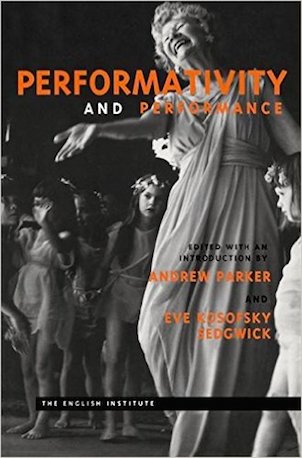Routledge, 1995
When is saying something doing something? And how is saying something doing something?
From the age of Aristotle to the age of AIDS, writers, thinkers, performers and activists have wrestled with what the question of “performance” is all about. Suddenly, theater studies has transformed itself from the study of plays to the study of performance. At the same moment, “performativity” — a new concept in language theory — has become a ubiquitous term in literary studies. What do these transformations have to do with one another? Is “performativity” necessarily theatrical? Are performances necessarily performative?
This volume of new work, by leading scholars in a wide range of fields, grapples with the nature of these two key terms, whose traces can be found everywhere: in the theater, in the streets, in philosophy, in issues of race and gender, in the sentences we speak.
Essays reexplore the classical definition of katharsis, its reinvention in Renaissance performance, in the circum-Atlantic cultures and in African American literature, JL Austin’s language theory, ideas in twentieth-century performance, and the performative nature of language in activism and hate-speech legislation. -From the jacket copy
Essays from the English Institute
CONTENTS
Acknowledgements
Introduction: Performativity and Performance / Andrew Parker and Eve Kosofsky Sedgwick
1 The Unhappy Performative / Timothy Gould
2 Culture and Performance in the Circum-Atlantic World / Joseph Roach
3 Writing the Absent Potential: Drama, Performance, and the Cannon of African-American Literature / Sandra L. Richards
4 Traumatic Awakenings / Cathy Caruth
5 Katharsis: The Ancient Problem / Andrew Ford
6 The Play of Conscience / Stephen Orgel
7 The Shudder of Catharsis in Twentieth-Century Performance / Elin Diamond
8 Performativity and Spacial Distinction: The End of AIDS Epidemiology / Cindy Patton
9 Burning Acts—Injurious Speech / Judith Butler
Bibliography
Contributors
